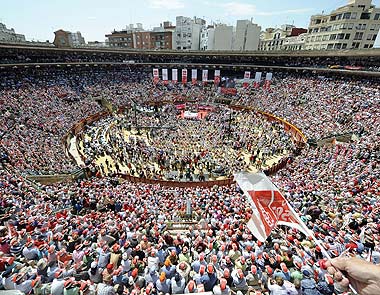Balkanization and returning empires in Central and Eastern Europe
The biggest failure in the past 30 years of European integration is related to the enlargement policy of the ex-Soviet countries. This policy, essentially driven by the greed of Western European companies (and beyond), was carried on at the cost of the continent’s political integration as a whole, but particularly of that of the Eastern populations. We have often mentioned the low turnout in the European elections for this Eastern region, once so eager to enter the EU. The Eastern part of the EU is now a patchwork of countries driven by different motivations, integrated to different degrees and crossed by interests of all kinds. The risk of disintegration and conflicts is enormous and threatens the European project... (GEAB by LEAP / June 2016)
EU must change ‘ideological’ policy on Russia, says Slovak FM
The EU needs to redefine its relations with Russia and evaluate economic sanctions, Slovakia’s foreign minister has said. “We need to redefine relationships and put it on realistic ground,” Miroslav Lajcak told journalists in Bratislava on Thursday (30 June) a day before Slovakia takes the six-month presidency of the EU Council. He said the EU had been “too ideological”, with western members states being “hypocritical” and eastern members “unrealistic”... (EUObserver)
Why elections are bad for democracy
Brexit is a turning point in the history of western democracy. Never before has such a drastic decision been taken through so primitive a procedure – a one-round referendum based on a simple majority. Never before has the fate of a country – of an entire continent, in fact – been changed by the single swing of such a blunt axe, wielded by disenchanted and poorly informed citizens... (The Guardian)
Europe, lacking an anchor, in the middle of the raging sea
For more than eight years now, the GEAB has also been describing a wide transition from a Western-centered world to a multi-polar world, showing its countless opportunities, but, above all, the dangers presented by such a reconfiguration whenever it is poorly controlled. Thus, we constantly call for the democratic anchoring of the integrated Europe ... which is essentially just an anchoring; we also call for the involvement of Europe at all new tables for debates aimed at rethinking governance at all levels, mainly at the Euro-BRICS table, which has such a potential for positive change. All crises which have crossed Europe since 2008-2009 have had as characteristics... (Excerpt - GEAB 99 by LEAP)
Russia to empty one of its sovereign funds next year - ministry proposal
Russia will exhaust one of its two sovereign funds next year, according to a finance ministry proposal seen by Reuters, having by that point run through $87 billion since the beginning of 2014 to fill holes in the budget left by a slump in oil prices. Russia will also spend over the next three years about a third of another of its funds on covering the budget shortfall, the proposal showed, even though that fund was originally intended to cover long-term deficits in the pension system... (Reuters)
Bye-Bye to the European Sky?
Shares in EasyJet, Ryanair, and British Airways-owner International Consolidated Airlines Group have fallen dramatically since the U.K. voted to leave the European Union on fears the British carriers could lose access to the EU’s single aviation market. Analysts on Credit Suisse’s Global Markets team have identified a possible flight path that would enable the airlines to safely navigate their way around the Brexit turbulence... (The Financialist)
When will the White House tell us the whole truth about drone killings?
The Situation Room, a commander-in-chief with rapidly graying hair, a cluster of grim-faced men and women debating the ethics and the legality of a killing. This is how the Obama administration has for years sought to portray its notorious global drone killing program: cautious, calculated and as conscientious as possible... (The Guardian)
Waging America’s Wars Using Renewable Energy
A major player in U.S. renewable energy happens to be a five-sided building in Virginia usually associated with deployment of power rather than consumption of it. The U.S. Department of Defense is the second-largest buyer of renewable electricity through deals meant to lock in long-term supply and provide incentives to developers of wind and solar projects, according to a database of more than 600 corporate power-purchase agreements (PPA) tracked by Bloomberg New Energy Finance... (Bloomberg)
Report: Berlin wants Juncker to resign as EU commission chief
Berlin is piling on pressure for European Commission president Jean-Claude Juncker to step down, according to the Sunday Times. The newspaper reported that German chancellor Angela Merkel is unhappy with how Juncker handled the lead up to Britain’s exit from the EU as well as his plans to take charge of its exit negotiations. An unnamed German minister told the paper that pressure for Juncker “to resign will only become greater and chancellor Merkel will eventually have to deal with this next year”... (EUObserver)
A Prime Minister, a Referendum and Italy’s Turn to Get Worried
It’s now a familiar refrain: A European prime minister calls a referendum, his job could be on the line and markets are getting worried. This time it’s not Britain’s David Cameron but Italy’s Matteo Renzi, who has called a vote on an ambitious overhaul of the political system aimed at ending the country’s unstable governments. If he loses, Renzi has promised to quit, an outcome that Citigroup Inc. called probably the biggest risk in European politics this year outside the U.K... (Bloomberg)
Diplomatic ties help Israel defang international criticism
Ahead of the release last week of a report on the Israeli-Palestinian conflict by the Quartet of Middle East mediators, the word from diplomats was that it would be hard-hitting, especially on Israel and its settlement building. The United States, the European Union and the United Nations were fed up with Israel's consistent violation of international law, which views all settlements on occupied land as illegal, diplomats said... (Reuters)
Can your smartphone really handle all your finances?
Would you be prepared to manage all your finances through your smartphone? This is the hope of many financial technology - fintech - start-ups aiming to transform our money management habits. They think we now trust our mobile technology enough to carry out banking, money transfers, investments and loan applications without ever stepping into a bank branch or writing a cheque. But are they right? ... (BBC)
Western Retreat Makes Room for Chinese Advance
As the West retreats from globalization—the Brexit vote was just the latest, though the most startling, manifestation of a populist trend—expect a new force to fill the gap. China has been rehearsing for this moment for years. In a global economy starved of growth and investment, it has both momentum and deep pockets. Its leaders are energized by the kind of international ambition that possessed the U.S. when it reshaped postwar Europe with the Marshall Plan... (WSJ)
Turkish Leader Erdogan Making New Enemies and Frustrating Old Friends
President Recep Tayyip Erdogan of Turkey spoke at a Ramadan feast at his palace last month in Ankara. Credit Yasin Bulbul/Presidential ... (NY Times) |
martes, 5 de julio de 2016
2016/07/05 Political Anticipation - A Press Review by LEAP
Suscribirse a:
Enviar comentarios (Atom)


























No hay comentarios:
Publicar un comentario
Se permiten solo aquellos comentarios que no sean ofensivos en su forma o su contenido, debiendo ser expresados en cualquier caso, con respeto a las personas e instituciones.